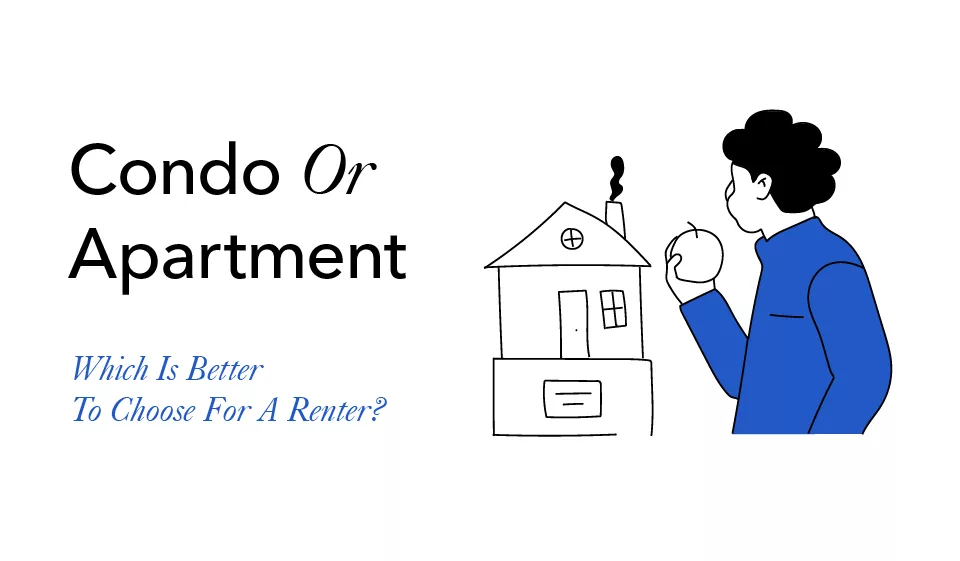
Estimated reading time: 5 minutes
Many renters and even landlords use the words “condo” and “apartment” interchangeably. However, when looking for a new rental, you should have an understanding of what is the difference between these two concepts to choose the one that better suits your requirements and expectations.
In this article, we’ll review the definitions of a condo and apartment, talk about what sets them apart, and discuss which one you should opt for when searching for a new home.
What Is a Condo vs. an Apartment?
Let’s start with the basics and see how to distinguish a condo from an apartment. In fact, they can appear identical — as one unit in a multistory residential building — with the main difference in property ownership. In the case of a condo, also called a condominium, every unit is sold individually and will have a separate homeowner. On the other hand, an apartment would be one unit in a building wholly owned and managed by one owner.

In terms of amenities, they would usually be the same, regardless of your rental property type: gym, parking, laundry room, and shared rooftop, among the most common ones. But, the upkeep of the amenities and common spaces lies with the HOA, or homeowners administration, when talking about condominiums. And, in the case of apartment buildings, the same individual owner would manage both single units and common areas.
Things to Keep in Mind When Choosing Between a Condo and an Apartment
Now, as we’ve covered the basic definition of condo vs. apartment, let’s discuss the main points that could affect you as a tenant.
Ownership
One of the most significant differences between a condo and an apartment is the ownership of each property. As we mentioned before, a condo is owned by one individual person, which means you will likely be dealing with a small landlord who has only a few rental properties to run. Apartments, on the other hand, would have only one owner for the whole building, and you would most likely turn to a property management company with any issues or questions you have. Also, this would influence your neighbors’ demographics: if you live in a condo, the majority of them would be homeowners; however, if you rent an apartment, all your neighbors could be fellow renters.
Flexibility
If your renting situation is somewhat uncommon, you have higher chances of finding a rental if you turn to a mom-and-pop landlord instead of a large property management company. As a rule of thumb, smaller landlords are more flexible and willing to compromise. For example, if you’re an expat with no history to provide a tenant screening report, have a low income and no guarantor, or have five pets, we recommend looking for condos instead of apartments.
Additionally, if you want to change something in your rental, for example, paint the walls or install a dishwasher, it might be much easier to negotiate if living in a condo, as property management in apartment buildings can have strict sets of rules and regulations.
Privacy
The factor of autonomy is another one to consider when choosing between renting a condo or an apartment. Sometimes, renters report that they have issues with smaller landlords, as they are more likely to violate privacy agreements and pay unannounced visits to check a property’s condition. However, many tenants also admit that they have excellent friendly relations with their landlords.
When it comes to renting an apartment, you will be dealing with a management company, hence your communication will be more business-like and impersonal. If you prefer to add some human touch to your rental experience, go for renting a condo, but beware that it could turn out both ways.
Price
Overall, there is no rule that one should be more expensive than the other to rent. As usual, a bigger factor would be the location, size, and condition of the rental property. However, in most cases, you would also have to pay HOA fees if renting a condo, which would add a few hundred dollars to your monthly rent. What’s more, depending on the city where you live, you might have a chance to find a rental apartment for cheaper under certain conditions. For example, NYC has rent-stabilized apartments, which are significantly cheaper than other options on the market.
However, as we discussed earlier, one of the main pros of renting a condo is the landlord’s flexibility and room for negotiation. They might be willing to negotiate the monthly rent if you offer to sign a lease for a longer term or convince them by having a high credit score and stellar recommendations from your past landlords.
Maintenance
The difference in ownership will have an impact on the property’s maintenance and upkeep and solving issues if they arise. In many apartment buildings, especially those more expensive, you can expect to have a maintenance crew on site. Even if not, any maintenance requests are usually quickly solved after you contact a property manager. However, it might take longer if you rent out a condo: your landlord might not have quick contact with the needed professional, or they might be gone for a week-long vacation.
In Conclusion
In general, the choice of whether to rent a condo or an apartment depends on your preferences and your personal situation. Renting a condo will be a better option if you are looking for a small landlord who can be more flexible and with whom you can build a friendly relationship. On the other hand, renting an apartment is an excellent choice for those who prefer to deal with a company that treats renting as a business and streamlines all main tasks, from calling a plumber to paying rent.